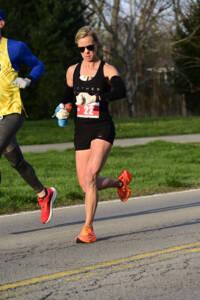One scroll through Instagram and you’ll likely be barraged by coffee alternatives to replace caffeine. If you’re caffeine sensitive, sure, these are good options. But if not, grab your cup of joe and start reading. Because guess what? Drinking coffee, especially coffee before running, is almost always a good idea.

Study after study after study shows the positive effects of caffeine for athletic performance from making running feel easier and feeling less tired or less in pain, to improving your mental edge. Next to carbs, caffeine is one of the best performance aids you can legally take in endurance sports.
So, if you are a regular coffee drinker, you can breathe easy.
Related: MUD/WTR vs. Coffee: What’s Better for Runners?
My coffee & running routine
I love coffee. So much. It’s the reason I get out of bed in the morning—especially if my running schedule calls for a 3:30 am wake-up. Maybe that sounds a tad dramatic….
I prep my coffee maker to start brewing and the smell of freshly brewed coffee lulls me awake. There would have to be a dire situation unfolding in my house (like something on fire) for me to ever skip my pre-run coffee first thing in the morning.
Drinking coffee before running wakes me up and “empties” me out. In fact, I have helped many of my athletes get over stomach issues by having them wake up 30 minutes earlier to drink coffee before running so they can “go.”
Related: How to Poop Before Running?
But of course, there can always be too much of a good thing. Your body can process the caffeine differently and you can “go” while running—not preferred. Or it can make you jittery and breathless.
I want to help you use your caffeine consumption to your full advantage. For this article, I got with registered sports dietitian Megan Robinson on the benefits and potential risks of drinking coffee before running, during, and even after.
I will cover:
- The pros of drinking coffee before running
- The potential cons of coffee and running
- Recommended usage of caffeine for runners before, during, and after a run
- How much caffeine should you drink for running (and what’s too much)
- Plus your caffeine game plan for running
Let’s go!
Is it good to drink coffee before you run?
Yes, it is good to drink coffee before running. In fact, it is GREAT! Research shows that drinking caffeinated coffee before running can lessen perceived effort, fatigue, and pain; and boost mental alertness and vigilance.
In fact, studies show that more than two-thirds of Olympic athletes tap into the power of caffeine to improve their running performance.

Another study showed that elite runners and recreational runners improved their 5k time by 1 percent by taking in caffeine before the race.
Related: Should You Eat Before You Run?
How does caffeine boost performance?
According to Robinson, caffeine helps boost energy by working in the central nervous system (CNS) as an ergogenic aid (something that improves use of energy) to “reduce fatigue and reduce pain sensations which are commonly felt during longer and intense workouts.”
Let’s take a closer look at why caffeine is good for runners and endurance athletes, in general. (Not all runners, though. Keep reading…)
Potential Positive Effects of Caffeine for Runners
- boosts your mental alertness
- improved motivation
- better focus
- increased energy
- reduced headaches
- increases runner’s high endorphins
- enhances fat-burning during exercise, sparing glycogen (important for marathon runners)
- boosts neuromuscular coordination (communication between nerve cells and muscles)
- enhances performance in hot weather
- antioxidants in coffee can improve recovery
- improves recovery by enhancing glycogen synthesis
But with the good must come the bad. There’s a reason why there is a movement to ditch caffeine. If you drink too much coffee, you replace performance benefits with potentially adverse effects.
Related: 20+ Snack Ideas for Runners
Potential Negative Side Effects of Caffeine for Runners
- triggers jitters

Pin these tips for drinking coffee before running for later! - increased heart rate (with potential for heart palpitations) and breathlessness making running feel harder
- GI distress causing you to need to “go” during running
- insomnia or sleep disruptions (especially if taken within 6 hours of bedtime)
- increased anxiety
- may cause tolerance and withdrawal symptoms
A lot of these caffeine symptoms are due to the caffeine content amount and timing of caffeine intake.
So, let’s cover how much caffeine you should take and when to drink coffee before running.
Related: Is Celsius Good for You?
How much caffeine is good before a run?
Robinson says 3 to 6 mg of caffeine per kg of body weight is best before running. So, if you weigh 150 pounds (68 kg), that is around 300 mg of caffeine before running or spread out throughout a long training session or competition to enhance sports performance.
Your genetics can determine how you metabolize caffeine, so you need to practice on training runs to find what works best for you. Drinking three cups of coffee before a big run may work for you, or you may need to drink one and have two caffeinated gels throughout your run, for example.
It’s also important to note that more caffeine isn’t always better. The dose response to caffeine and performance may plateau around 3 milligrams of caffeine per kilogram of bodyweight.
Related: How to Become a Morning Runner
How much caffeine is too much before a run?

At most, a runner can have about 6 kg of caffeine per kg during training without it negatively impacting hydration and performance.(Robinson recommends 3 mg/kg).
High doses of caffeine intake, 6 to 9 mg per kg of bodyweight, can cause negative effects such as jitters, increased heart rate, and GI distress.
Related: Is Prime Energy Good for Runners?
How long before a run should I drink coffee?
For most runners, the sweet spot of drinking coffee before a run is 30-60 minutes. The reaction time for caffeine for most people is between 15-20 minutes with it peaking about an hour later, and still lasting up to 4-6 hours in the bloodstream. Some people may metabolize caffeine more slowly and need to drink coffee more than an hour before.
Again, test this out on your long runs!
How much caffeine should I have during my run?
Runners can have 3-6 mg of caffeine per kg of bodyweight before or during a run. Therefore, if you have half of your max before your run, you can have the rest spread out throughout your run.
Caffeine effects can be felt about 20 minutes after taking it, peaks around an hour, but still remains in the body for up to 6 hours. If you are running for a long time, consider taking a quarter to a half of your total caffeine amount before running, and refueling throughout the race.
Scenario 1: Say you are a 175 pound 4 hour marathoner. Your caffeine max is around 400 mg. You may have two cups of coffee (200 mg) before your marathon, then a caffeinated gel (100 mg) at mile 10, and another at mile 18, for example.
Scenario 2: Say you are a 130 pound 3 hour marathoner. That means the most caffeine you can likely have without negative effects is 300 mg. So, you may have two cups of coffee (200 mg) before your marathon. Then a caffeinated gel (100mg) at the halfway point.
Related: Ultimate Fueling Guide for Runners
Should I have coffee after a run?
Surprisingly, drinking coffee after a run or having another caffeinated source can enhance recovery.
Scientific studies found that having caffeine after a hard workout helps with muscle glycogen synthesis by about 60 percent more than carbs alone. Replenishing glycogen stores is key for recovery and reducing muscle soreness. Robinson recommends doing this after training runs, but not necessarily after your marathon or goal race considering you probably maxed out your caffeine intake.
The antioxidants in coffee can also help recovery as some antioxidants help reduce the body’s inflammatory response to exercise. You just don’t want too many antioxidants as they can inhibit the body’s natural recovery. Therefore, avoid pairing caffeine with a fruit smoothie right after running.
Related: How I Fueled my 2:54 Marathon
Do marathon runners use caffeine?

Yes, marathon runners use caffeine before and during their runs. Moderate levels of caffeine have been shown to improve athletic performance by about 2 percent which is much as 5 minutes in a 4-hour marathon!
Does caffeine increase heart rate?
Caffeine can increase your heart rate during running, especially during hard running. On average, caffeine decreases heart rate at rest, and low to moderate intensity exercise but it increases during intense workouts. A higher heart rate CAN make running feel harder.
Key Considerations for Taking Caffeine Before Running
- Aim to take 3 to 6 mg of caffeine per kilogram of bodyweight.
- More is not better, so taking more than 6 mg per kg may have potentially adverse side effects that can hurt performance.
- Ingest caffeine 30-60 minutes before exercise. (30 minutes before shorter intense runs and 60 minutes before long runs).
- Don’t drink coffee on an empty stomach. Always drink coffee before running with food as caffeine isn’t an energy source so you need carbs to go with it.
- If you are sensitive to caffeine, try drinking it more than an hour before, spread out in smaller doses, and do not intake more than 6 mg/kg total.
- Pay attention to when you feel the effects of caffeine, how long they last, and if you have any side effects from your dosage.
- Taking a caffeinated gel halfway throughout a longer race or in the latter half can help with fatigue.
- Have your last caffeinated beverage or other caffeine source at least 6 hours before bedtime to avoid sleep disruptions.
- Note that different caffeine sources have different doses of caffeine. If you want exact amounts, use an energy gel.
- Caffeine can lose its effects overtime. For optimal effects, do a “caffeine taper” where you reduce and stop intake 1-2 weeks out, suggests Robinson.
Remember, as with any nutrition intervention, you need to test it out during training and NOT on race days, says Robinson. “Figuring out what type of caffeinated product that works for you and the amount needed before and during training is key to avoid any surprises on race day!”

Caffeine Fuel Options for Runners
Runners can supplement their pre-run coffee with other caffeine sources on the run. Here are some options:
- Maurten Caffeinated Gel (nice and gentle)
- SIS GO Energy caffeinated Gel (palpable difference)
- Chocolate-covered coffee beans
- CLIF Bloks Energy Chews
- Caffeine Pills
If coffee isn’t your cup of tea, other caffeinated beverages such as tea, soda or energy drinks like Amino Energy or Celsius can provide the caffeine needed for a boost in your energy levels.
Related: The Best Energy Gels for Runners
Your Caffeine and Running Game Plan
Here is a general guide for how to use caffeine to enhance your running performance.
- 30-60 minutes before running, drink 1-2 cups of coffee totaling 100-200 mg of caffeine. Pair with simple carbs for breakfast.
- Halfway through the race or run, take one gel with 100 mg of caffeine.
- Refuel with about 100 mg of caffeine to aid recovery if you haven’t hit your max caff intake and have more training to do.
Use this as a starting guide for your fueling, and tinker with the dosage and timing to best suit for your body and performance!
If you want guidance with your running goals, including fueling, check out my run coaching services. Also, be sure to check out my free training plans:
- Postpartum Training Plan
- After a Break Training Plan
- 5k Training Plans
- 10k Training Plans
- Half Marathon Training Plans
- Marathon Training Plans
- Strength Training Plan

